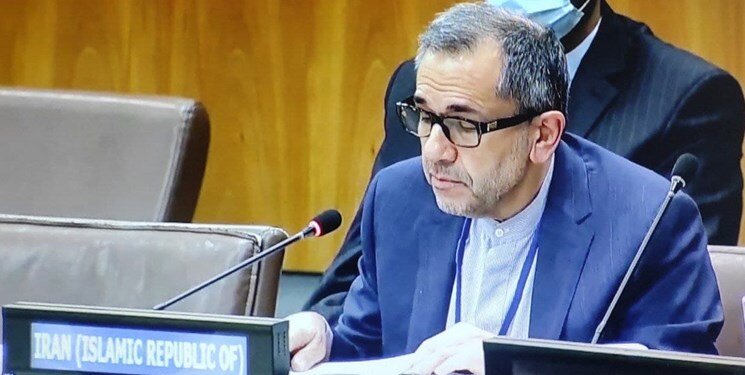Iran calls for full, non-discriminatory implementation of Chemical Weapons Convention

TEHRAN - Majid Takht Ravanchi, Iran’s Ambassador and Permanent Representative to the United Nations has called to the full implementation of the Chemical Weapons Convention.
Addressing a United Nations Security Council meeting on Syria on Thursday, the Iranian diplomat said, “The politicization of the implementation of the Chemical Weapons Convention and the use of the Organization for the Prohibition of Chemical Weapons for political purposes have major negative consequences for the authority and validity of the Convention and the organization,” according to Fars News.
In this meeting, he called for the full, effective and non-discriminatory implementation of the Chemical Weapons Convention, as well as the preservation of the authority and competence of the organization.
Referring to the implementation of Syria's obligations, Takht Ravanchi said, “Syria is fulfilling its obligations under the Convention and will continue to cooperate with the Organization for the Prohibition of Chemical Weapons and it has submitted its 98th report on the destruction of chemical weapons on its soil on January 17, 2022. In addition, Syria has regularly provided information to the Technical Secretariat of the Organization for the Prohibition of Chemical Weapons and the UN Secretariat on the possession and use of chemical weapons by some terrorist organizations.”
Earlier in late February, Zahra Ershadi, Deputy Permanent Representative of Iran to the United Nations, issued a similar statement on the situation in Syria. “As a major victim of the most systematic use of chemical weapons, Iran once again expresses its strong opposition to the use of chemical weapons by anyone, anywhere, and under any circumstances. We reiterate our call for the full, effective, and non-discriminatory implementation of the Chemical Weapons Convention and the upholding of the OPCW's authority, and we stand ready to actively and constructively contribute to that end,” Ershadi said in her statement to the UN Security Council.
She added, “We repeat, however, our concern about the serious effects of politicizing the Convention's implementation on its authority and credibility.
The Organization must not be used to accomplish politically motivated national objectives. In the last couple of years, Syria has been experiencing such attempts by some State Parties. We welcome Syria's ongoing cooperation with the OPCW, including the filing of its 98th report on January 17, 2022 relating to the destruction of chemical weapons and associated production facilities on its territory. Furthermore, during the last year, letters were exchanged between Syria’s Foreign Minister and the Organization's Director-General in the context of the issues developed through the years of collaborative work.”
Ershadi noted, “The information provided by Syria to both the Technical Secretariat of the Organization for the Prohibition of Chemical Weapons and the General Secretariat of the United Nations about the possession and use of chemical materials by terrorist organizations as well as the fabrication of chemical incidents to accuse the Syrian Army need to be taken up by the Council. It is equally important to note that the meetings of the Security Council on the chemical file should not be dedicated to the repetition of positions of member states and the discussions of unfounded allegations while the Syrian government has made substantial progress in fulfilling its obligations under the Convention. Therefore, it is wise for the Council to revisit the decision to maintain monthly meetings to discuss the Syrian chemical file. Such meetings undermine the Convention's authority and the OPCW's reputation, rather than achieving the Convention's purposes.”
She concluded, “Only thorough destruction and elimination of all chemical weapons globally, and the implementation of all essential measures to ensure that such weapons are not created, one can be certain that chemical weapons will not be used again. This objective has yet to be realized because the U.S., as the only remaining possessor State Party, is not complying with its obligations regarding the final extended deadline for the destruction of chemical weapons. Another stumbling block is the Convention's lack of universality. To achieve this great goal, the Israeli regime must be compelled to join the Convention immediately and without conditions.”
